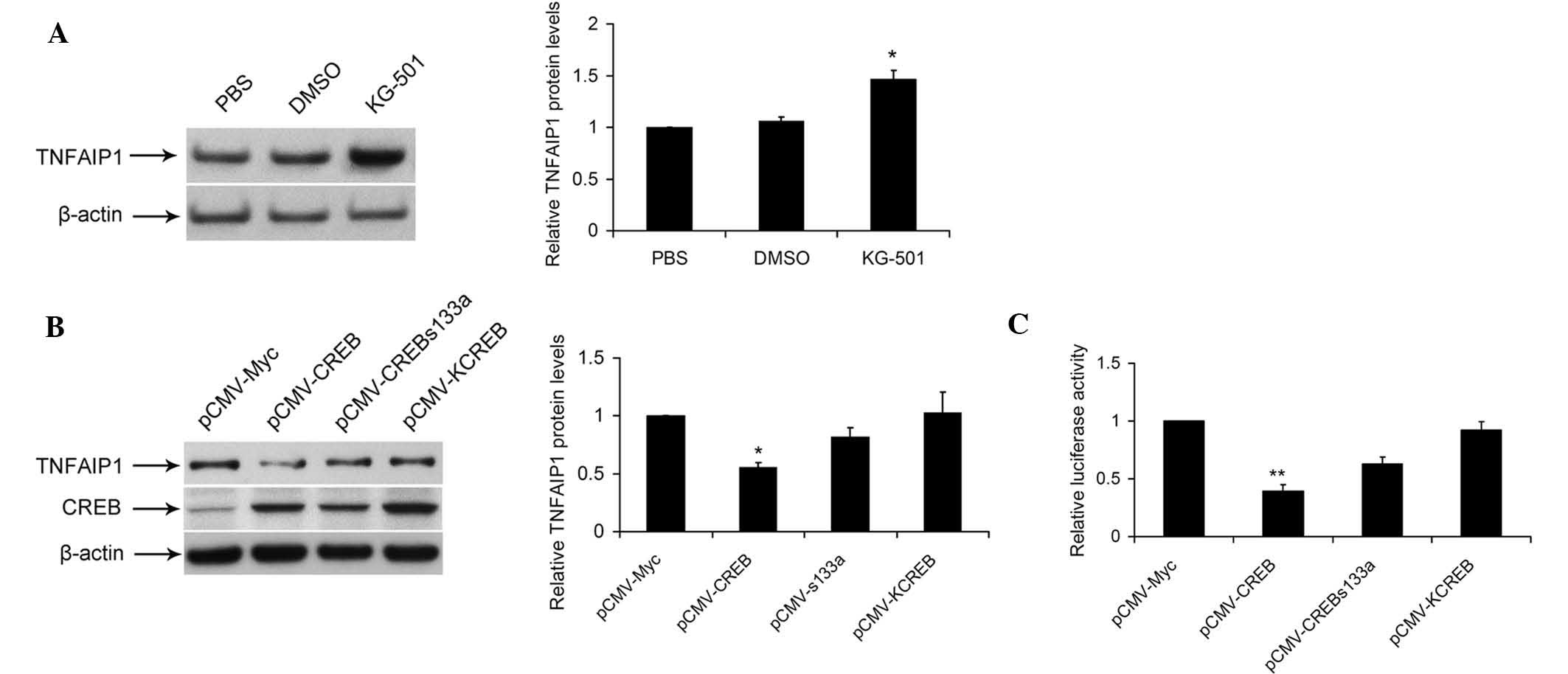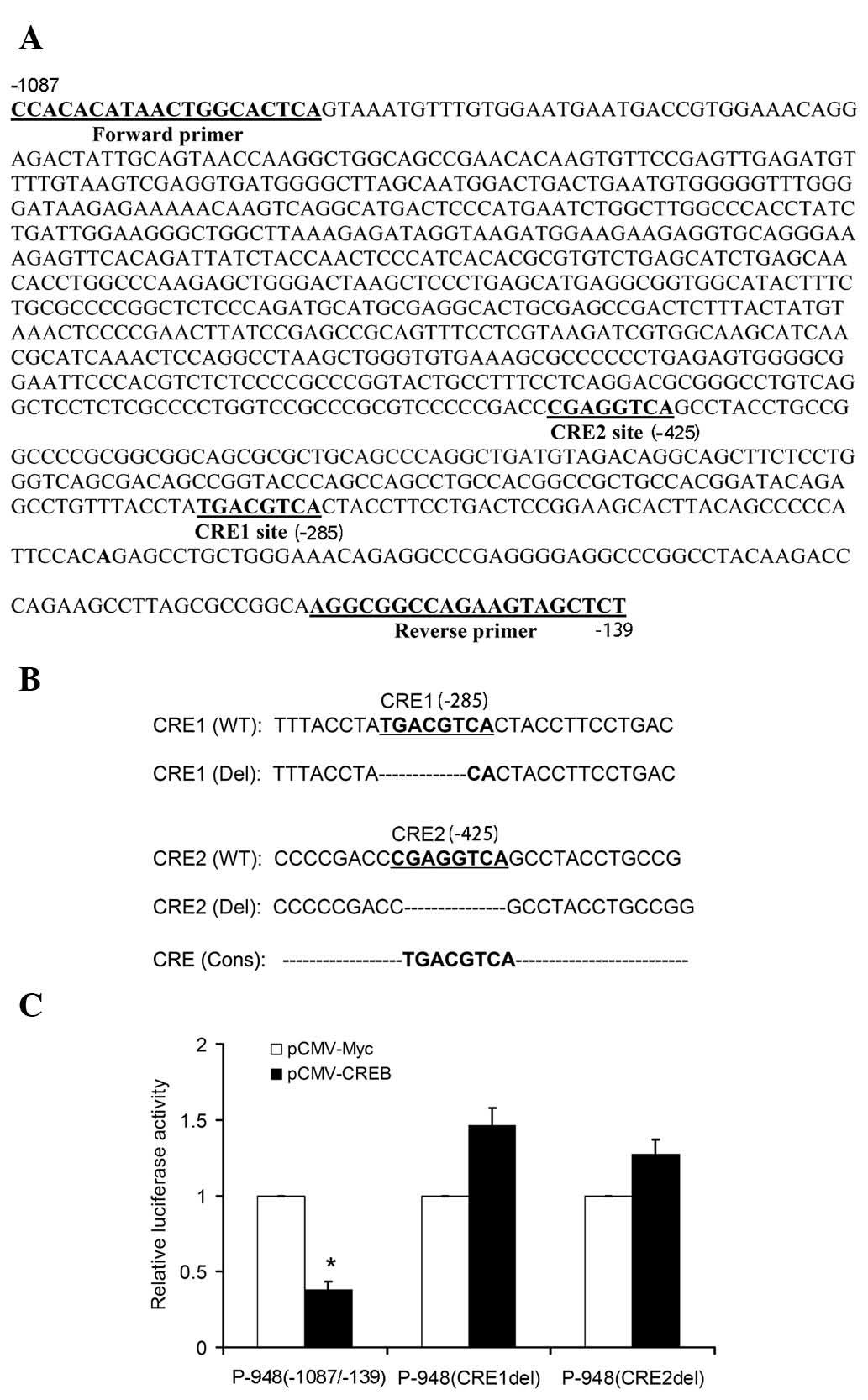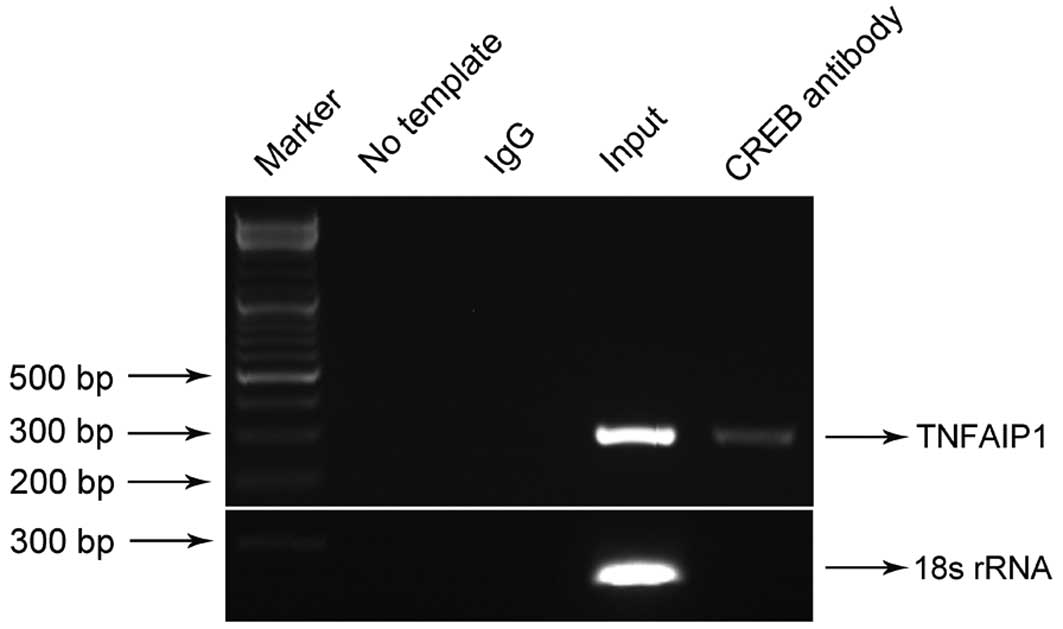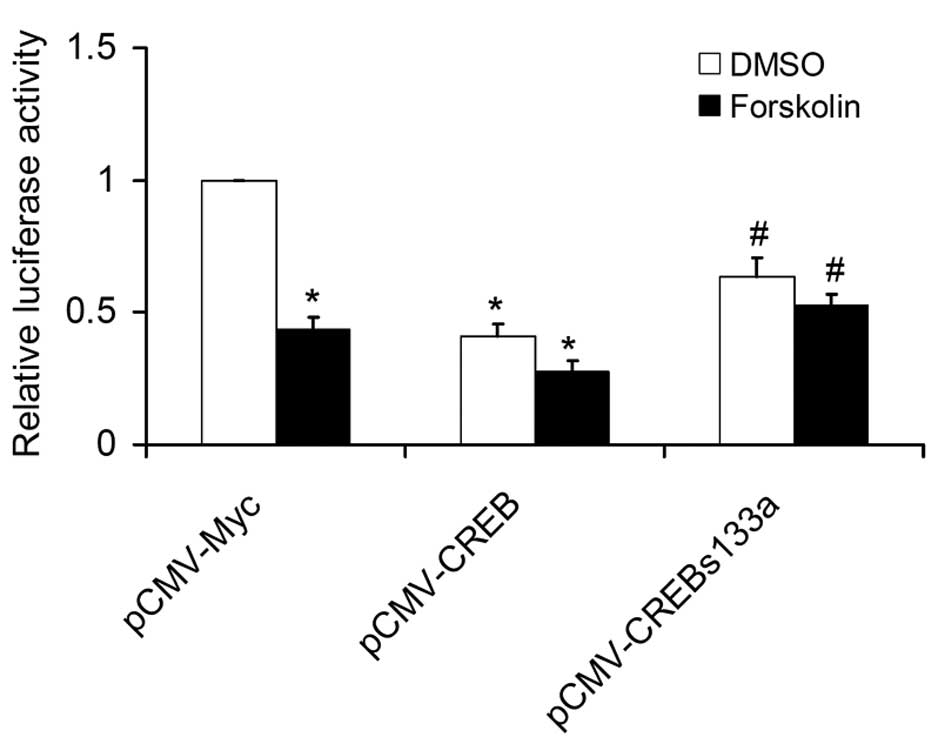|
1
|
Wolf FW, Marks RM, Sarma V, Byers MG, Katz
RW, Shows TB and Dixit VM: Characterization of a novel tumor
necrosis factor-alpha-induced endothelial primary response gene. J
Biol Chem. 267:1317–1326. 1992.PubMed/NCBI
|
|
2
|
Zhou J, Hu X, Xiong X, Liu X, Liu Y, Ren
K, Jiang T, Hu X and Zhang J: Cloning of two rat PDIP1 related
genes and their interactions with proliferating cell nuclear
antigen. J Exp Zool A Comp Exp Biol. 303:227–240. 2005. View Article : Google Scholar : PubMed/NCBI
|
|
3
|
Yang L, Liu N, Hu X, Zhang W, Wang T, Li
H, Zhang B, Xiang S, Zhou J and Zhang J: CK2 phosphorylates TNFAIP1
to affect its subcellular localization and interaction with PCNA.
Mol Biol Rep. 37:2967–2973. 2010. View Article : Google Scholar
|
|
4
|
Kim DM, Chung KS, Choi SJ, Jung YJ, Park
SK, Han GH, Ha JS, Song KB, Choi NS, Kim HM, et al: RhoB induces
apoptosis via direct interaction with TNFAIP1 in HeLa cells. Int J
Cancer. 125:2520–2527. 2009. View Article : Google Scholar : PubMed/NCBI
|
|
5
|
Chen Y, Yang Z, Meng M, Zhao Y, Dong N,
Yan H, Liu L, Ding M, Peng HB and Shao F: Cullin mediates
degradation of RhoA through evolutionarily conserved BTB adaptors
to control actin cytoskeleton structure and cell movement. Mol
Cell. 35:841–855. 2009. View Article : Google Scholar : PubMed/NCBI
|
|
6
|
Link CD, Taft A, Kapulkin V, Duke K, Kim
S, Fei Q, Wood DE and Sahagan BG: Gene expression analysis in a
transgenic Caenorhabditis elegans Alzheimer's disease model.
Neurobiol Aging. 24:397–413. 2003. View Article : Google Scholar : PubMed/NCBI
|
|
7
|
Liu M, Sun Z, Zhou A, Li H, Yang L, Zhou
C, Liu R, Hu X, Zhou J, Xiang S and Zhang J: Functional
characterization of the promoter region of human TNFAIP1 gene. Mol
Biol Rep. 37:1699–1705. 2010. View Article : Google Scholar
|
|
8
|
Johannessen M, Delghandi MP, Seternes OM,
Johansen B and Moens U: Synergistic activation of CREB-mediated
transcription by forskolin and phorbol ester requires PKC and
depends on the glutamine-rich Q2 transactivation domain. Cell
Signal. 16:1187–1199. 2004. View Article : Google Scholar : PubMed/NCBI
|
|
9
|
Sárvári M, Szego EM, Barabás K, Jávor A,
Tóth S, Kovács Z and Abrahám IM: Genistein induces phosphorylation
of cAMP response element-binding protein in neonatal hypothalamus
in vivo. J Neuroendocrinol. 21:1024–1028. 2009. View Article : Google Scholar : PubMed/NCBI
|
|
10
|
Best JL, Amezcua CA, Mayr B, Flechner L,
Murawsky CM, Emerson B, Zor T, Gardner KH and Montminy M:
Identification of small-molecule antagonists that inhibit an
activator: Coactivator interaction. Proc Natl Acad Sci USA.
101:17622–17627. 2004. View Article : Google Scholar : PubMed/NCBI
|
|
11
|
Liu N, Yu Z, Li Y, Yuan J, Zhang J, Xiang
S and Wang X: Transcriptional regulation of mouse neuroglobin gene
by cyclic AMP responsive element binding protein (CREB) in N2a
cells. Neurosci Lett. 534:333–337. 2013. View Article : Google Scholar :
|
|
12
|
Liu N, Yu Z, Xiang S, Zhao S,
Tjarnlund-Wolf A, Xing C, Zhang J and Wang X: Transcriptional
regulation mechanisms of hypoxia-induced neuroglobin gene
expression. Biochem J. 443:153–164. 2012. View Article : Google Scholar : PubMed/NCBI
|
|
13
|
Wang Z, Zhang XJ, Li T, Li J, Tang Y and
Le W: Valproic acid reduces neuritic plaque formation and improves
learning deficits in APP(Swe)/PS1(A246E) transgenic mice via
preventing the prenatal hypoxia-induced down-regulation of
neprilysin. CNS Neurosci Ther. 20:209–217. 2014. View Article : Google Scholar
|
|
14
|
Li RP, Wang ZZ, Sun MX, Hou XL, Sun Y,
Deng ZF and Xiao K: Polydatin protects learning and memory
impairments in a rat model of vascular dementia. Phytomedicine.
19:677–681. 2012. View Article : Google Scholar : PubMed/NCBI
|
|
15
|
Vitolo OV, Sant'Angelo A, Costanzo V,
Battaglia F, Arancio O and Shelanski M: Amyloid beta-peptide
inhibition of the PKA/CREB pathway and long-term potentiation:
Reversibility by drugs that enhance cAMP signaling. Proc Natl Acad
Sci USA. 99:13217–13221. 2002. View Article : Google Scholar
|
|
16
|
Bagheri M, Joghataei MT, Mohseni S and
Roghani M: Genistein ameliorates learning and memory deficits in
amyloid β(1–40) rat model of Alzheimer's disease. Neurobiol Learn
Mem. 95:270–276. 2011. View Article : Google Scholar
|
|
17
|
Gonzalez GA and Montminy MR: Cyclic AMP
stimulates somatostatin gene transcription by phosphorylation of
CREB at serine 133. Cell. 59:675–680. 1989. View Article : Google Scholar : PubMed/NCBI
|
|
18
|
Biermann J, Grieshaber P, Goebel U, Martin
G, Thanos S, Di Giovanni S and Lagrèze WA: Valproic acid-mediated
neuro-protection and regeneration in injured retinal ganglion
cells. Invest Ophthalmol Vis Sci. 51:526–534. 2010. View Article : Google Scholar
|
|
19
|
Lovekamp-Swan T, Glendenning M and
Schreihofer DA: A high soy diet reduces programmed cell death and
enhances bcl-xL expression in experimental stroke. Neuroscience.
148:644–652. 2007. View Article : Google Scholar : PubMed/NCBI
|
|
20
|
Liu H, Yang L, Zhao Y, Zeng G, Wu Y, Chen
Y, Zhang J and Zeng Q: Estrogen is a novel regulator of Tnfaip1 in
mouse hippocampus. Int J Mol Med. 34:219–227. 2014.PubMed/NCBI
|
|
21
|
Walton M, Woodgate AM, Muravlev A, Xu R,
During MJ and Dragunow M: CREB phosphorylation promotes nerve cell
survival. J Neurochem. 73:1836–1842. 1999.PubMed/NCBI
|
|
22
|
Mabuchi T, Kitagawa K, Kuwabara K,
Takasawa K, Ohtsuki T, Xia Z, Storm D, Yanagihara T, Hori M and
Matsumoto M: Phosphorylation of cAMP response element-binding
protein in hippocampal neurons as a protective response after
exposure to glutamate in vitro and ischemia in vivo. J Neurosci.
21:9204–9213. 2001.PubMed/NCBI
|
|
23
|
Chrivia JC, Kwok RP, Lamb N, Hagiwara M,
Montminy MR and Goodman RH: Phosphorylated CREB binds specifically
to the nuclear protein CBP. Nature. 365:855–859. 1993. View Article : Google Scholar : PubMed/NCBI
|
|
24
|
Parker D, Ferreri K, Nakajima T, LaMorte
VJ, Evans R, Koerber SC, Hoeger C and Montminy MR: Phosphorylation
of CREB at Ser-133 induces complex formation with CREB-binding
protein via a direct mechanism. Mol Cell Biol. 16:694–703. 1996.
View Article : Google Scholar : PubMed/NCBI
|
|
25
|
Wilson BE, Mochon E and Boxer LM:
Induction of bcl-2 expression by phosphorylated CREB proteins
during B-cell activation and rescue from apoptosis. Mol Cell Biol.
16:5546–5556. 1996. View Article : Google Scholar : PubMed/NCBI
|



















